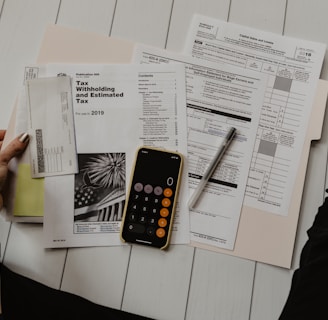Why Tax Planning is Important
Waiting until tax time to address your tax situation can significantly limit your ability to reduce your taxable income and optimize your financial position. Here's why proactive tax planning is essential and why you shouldn't wait until the last minute.
Stephany Pruitt
2/2/20252 min read


Why Tax Planning Matters: Don't Wait Until It's Too LateTax planning is a crucial aspect of financial management that many people overlook until it's too late. Waiting until tax time to address your tax situation can significantly limit your ability to reduce your taxable income and optimize your financial position. Here's why proactive tax planning is essential and why you shouldn't wait until the last minute:
Maximizing Deductions and Credits
By engaging in tax planning early, you can identify and take advantage of all available deductions and credits throughout the year1. This proactive approach allows you to:
Structure your finances to meet specific criteria for valuable tax benefits
Maintain proper documentation for each deduction and credit
Significantly reduce your tax liabilities by the time tax season arrives
Strategic Financial Decision-Making
Early tax planning enables better financial decision-making throughout the year3. When you understand the potential tax implications of your choices, you can:
Make more informed decisions about investments
Plan business expenses more effectively
Allocate resources strategically to minimize tax burden
Optimizing Income and Expense Timing
With proper tax planning, you can strategically time your income and expenses to your advantage4. This might involve:
Deferring certain income to future tax years
Accelerating deductible expenses
Adjusting your tax withholdings to avoid overpayment or underpayment
Reducing Errors and Stress
Starting your tax planning early gives you ample time to review your financial situation, reducing the likelihood of errors that could delay your refund or trigger an audit4. This approach also helps alleviate the stress associated with last-minute tax preparation.
Preventing Identity Theft
Filing your taxes early is an effective strategy to prevent tax-related identity theft4. By submitting your return before potential fraudsters, you protect yourself from having a false return filed in your name.
Long-Term Financial Benefits
Tax planning isn't just about the current year; it's a long-term strategy that can have significant impacts on your financial future3. It can help you:
Save for retirement more effectively
Plan for major life events like education expenses or buying a home
Build a more robust financial foundation for your future
Remember, waiting until tax time is often too late to make meaningful changes to your taxable income. Many tax-saving strategies require action throughout the year. By the time you're ready to file, most opportunities to reduce your tax burden have already passed.In conclusion, effective tax planning is an ongoing process that should be integrated into your overall financial strategy. By starting early and staying proactive, you can maximize your tax savings, make better financial decisions, and set yourself up for long-term financial success. Don't wait until it's too late – start your tax planning today.
info@bookkeeper.tax
(734)402-7777
© 2025. All rights reserved, Starrany, LLC
Intuit® and QuickBooks are trademarks and service marks of Intuit Inc., registered in the United States and other countries. Intuit®, QuickBooks®, and QuickBooks ProAdvisor® are registered trademarks of Intuit Inc., used with permission
Office Hours
Monday - Friday:
9:00 AM - 7:00 PM
Saturday By Appointment
Let US Help
Disclaimer for Bookkeeping, Tax Preparation and Tax Planning Services
The information provided on this website is for general informational purposes only and should not be considered as professional legal, financial, or tax advice. We are bookkeepers and tax preparers, not lawyers or Certified Public Accountants (CPAs). Our services are limited to bookkeeping and tax return preparation. We do not provide legal advice, financial planning, or investment recommendations.
The information provided on this website is for general informational purposes only and should not be considered as professional legal, financial, or tax advice. We are tax preparers and bookkeepers, not lawyers, financial advisors or Certified Public Accountants (CPAs). Our services are limited to tax preparation, basic tax planning, and bookkeeping. We do not provide legal advice or services that require CPA certification or investment advice. The information we provide should not be used as a substitute for consultation with qualified legal, financial advisor or accounting professionals.
The accuracy and completeness of our services depend on the information provided by our clients. We are not responsible for any errors or omissions resulting from inaccurate or incomplete information supplied to us. Clients are encouraged to review all documents carefully before signing and to consult with appropriate professionals for specialized advice tailored to their individual situations. By using our services, you acknowledge that you have read, understood, and agree to the terms outlined in this disclaimer. We reserve the right to modify this disclaimer at any time without prior notice. By using our services, you acknowledge that you have read, understood, and agree to the terms outlined in this disclaimer. We reserve the right to modify this disclaimer at any time without prior notice. This disclaimer is provided to clarify the nature and limitations of our services. If you have any questions about this disclaimer or our services, please contact us directly.
